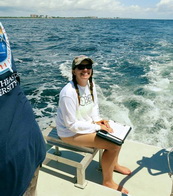 NSU student Rachael Karns funded her graduate thesis project in a modern, innovative manner: She launched a successful crowdfunding campaign on experiment.com, a website focused on supporting scientific discoveries through online public donations.
NSU student Rachael Karns funded her graduate thesis project in a modern, innovative manner: She launched a successful crowdfunding campaign on experiment.com, a website focused on supporting scientific discoveries through online public donations.
At NSU’s Halmos College of Natural Sciences and Oceanography, Karns is pursuing a Master of Science in Marine Biology degree. She is also enrolled in NSU’s graduate certificate program in computational molecular biology, which teaches students how to interpret complex genomic data.
Her crowdfunding campaign entitled, “Sharks Host Bacteria, But What Are They?”, raised more than $3,100 for her project. Pompano Dive Center, which donated proceeds from a dive, was pivotal in raising funds, while individual donations were also critical in reaching her goal.
When crowdfunding, scientists and students seeking financial support must explain complex scientific projects and their goals in a way that is easily understood and relevant to prospective donors.
“They require that we write a proposal explaining why we need the funds, what our work entails, and what our specific goals are,” Karns said. “The challenge is that I had to write the proposal in a way that appeals to the general public, which is a great exercise for any scientist. The website [experiment.com] has a very thorough review process. Their team of scientists reviewed my submission and gave me feedback as to how I could improve my campaign. They also required that I had at least one endorsement for my project to launch.”
The goal of Karns’ project is to characterize the microbiome (microbial communities) of sharks in South Florida. Shark microbiomes remain under characterized in the field of animal genomics. Characterizing the microbiome of various shark species will enable the identification of the most important microbial “symbionts,” which are an animal’s normal flora.
Karns’ study will examine the microbiome of sharks in a comprehensive manner, including four sample locations per individual (skin, teeth, cloaca, and gills). This will help determine if unique bacteria exists when compared to the water in which the shark lives.
“From Rachael’s experience with experiment.com, crowdfunding appears to be an effective tool for small-scale funding in science with rigorous submission criteria,” said Mahmood Shivji, Ph.D., professor at the Halmos College and director of NSU’s Guy Harvey Research Institute (GHRI) and Save Our Seas Shark Research Center. “The campaign was not only successful in raising funds, but also demonstrated Rachael’s skills in communicating the importance and goals of the research to the general public. Her success will be an encouraging example to other students of entrepreneurial fund-raising.”
“It highlights the perspective that all scientists should think about– the impact their research has on society as a whole,” said Jose V. Lopez, Ph.D., professor at the Halmos College, who suggested that Karns try crowdfunding. “Rachael has done a great job nurturing this campaign at the grassroots. A lot of leg work and personal contact is involved compared to traditional grant requests.”
Karns earned a bachelor’s degree from Roanoke College in Salem, Virginia, with majors in biological sciences and theater. At NSU, her field research is made possible by the shark tracking program at the Guy Harvey Research Institute, which allows her to collect samples from the sharks under the supervision of Derek Burkholder, Ph.D., research associate and scientist at GHRI.
“Rachael’s work will be very important, as there are many gaps regarding microbiome diversity,” Lopez said. “The shark is a mobile predator and certain species have never been characterized for their microbiome. My lab typically works on sessile marine invertebrates, such as sponges and corals. The shark (along with bats and humans) represents a new area of research for us, and we’re glad that Rachael has decided to tackle it. She will learn a lot of molecular biology and extensive statistical analyses by the time she is done.”
“I already had an interest in molecular biology, and sharks are very close to my heart. So, I decided it was a good combination,” Karns said. “I found that there is almost no existing research in the area, and there are no existing papers that have used the protocol we are using for my project. I knew there was plenty of room to grow and explore in the field.
“Dr. Shivji also encouraged me [by noting] there could be a medical application of my research in which we could potentially improve treatments for shark-bite victims based on our findings. All of these factors made me very excited about this topic.”

